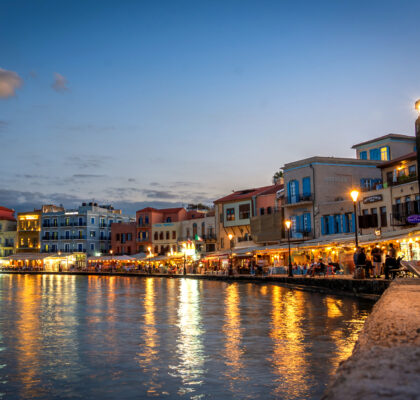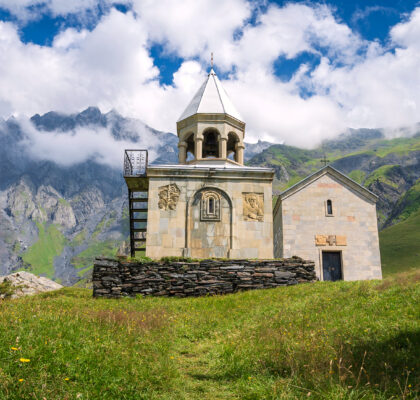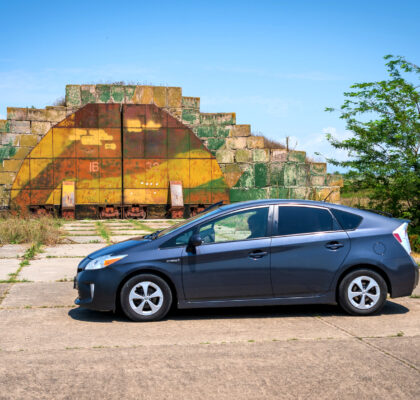After spending six weeks tootling around the country, we completed our Georgian experience in its capital city Tbilisi.

Favourably located at the crossroads between Europe and Asia, Tbilisi was a hub along the Silk Road, the network of Eurasian trade routes active from the second century BCE until the mid-15th century. Naturally, powerful empires throughout the centuries sought to control the “gateway” to the Caucasus region, and the city was captured, sacked, and rebuilt numerous times.

Control of modern Tbilisi has been no less chaotic. During a short-lived (two-week) civil war at the end of 1991, the democratic government of the newly independent Republic of George was overthrown in a military coup. A former member of the Soviet politburo, Eduard Shevardnadze, was elevated to president, a role he would hold until 2003. Tbilisi under Shevardnadze was a breeding ground for crime and corruption, and frequently the scene of violent confrontations between members of the Russian mafia. Quality of life was abysmal, and not just in the capital city, all of Georgia suffered economically in the years immediately following the Soviet Union’s collapse. On November 3, 2003, after the results of a questionable election were announced, mass protests erupted on the streets of Tbilisi. They continued for the next 20 days before culminating in the Rose Revolution when demonstrators, with red roses in hand, stormed the Parliament. Shevardnadze resigned, putting an end to Soviet-style autocracy. Six weeks later the National Movement – Democrats party was voted into power. Georgia had turned the corner with Tbilisi leading the way.

Dollars – Despite being the largest city in Georgia, Tbilisi was still exceedingly budget-friendly.
| Cost/Day (2 people/12 nights) |
What’s Included? | |
|---|---|---|
| Basic living expenses | $97/day Canadian ($72 USD / €64) |
Accommodation, groceries/wine, restaurants |
| All-inclusive nomadic expenses | $112/day Canadian ($83 USD / €74) |
Basic expenses above plus: bus from Batumi to Tbilisi, airport transportation, subscriptions (Netflix and other streaming services, website hosting, Adobe Lightroom, VPN, misc apps, etc.), and health insurance |

Environment – We stayed in two different Airbnbs while in Tbilisi. The first was just a couple of nights before we picked up a rental car for our 29-day road trip, and will forever be remembered for its “mini-market.” We are always delighted on the rare occasions when a host leaves a small welcome basket. This Airbnb took a slightly different approach. The refrigerator, the kitchen counter, and several cupboards were stocked with items for sale. Deli meats, cheese, chocolate, and single-serve beverages filled the fridge.

A couple of cupboards contained non-perishable items like chips, ramen noodles, and canned goods, and multiple cupboards were filled to capacity with wine (red, white, and sparkling) plus a variety of hard liquor choices.

Every single item had a small price sticker, even the coffee pods and tea bags were individually priced, relying on the honour system for payment – you noted what you used in a small receipt book, then left the corresponding cash when you checked-out. Mind-boggling.


The second unit was more traditional and a preferable setup. It was nicely located in a residential building overlooking a neighbourhood football (soccer) field that saw nearly constant action, often until the wee hours of the morning with the aid of overhead floodlights. Its only unusual feature was the fee-for-service elevator. Just a paltry 25¢, however the elevator wouldn’t move until you swiped your key fob. The Airbnb host must have built the cost into his nightly rate because we weren’t charged any extra but did make an effort to use the stairs whenever we left the building; we were on the 7th floor and felt zero compunction using it to go up.

Tips, Tricks & Transportation – Tbilisi does have a metro system, consisting of two lines with a total of 23 stations, but all of our sightseeing goals were achieved on foot. Although the city is a tad hilly, the sidewalks are fairly well-maintained and we thought it very walkable. We did use the ride-share service Bolt to get back and forth between the airport.

While streaming services effectively meet our nightly TV viewing needs, we do enjoy the occasional movie night in a cinema. During our travels we’ve discovered that many theaters offer at least one daily showing of a currently released blockbuster film in its original English format (just be sure the showtime you’re booking has an ENG symbol displayed), and ticket prices are generally lower than what we’d expect to pay in Canada. We got the big screen experience for Deadpool 3 (in 3-D no less) for $9/pp CAD, sharing the theatre with four other people.

Out and About – Walking about in Tbilisi was a markedly different experience from other large European cities. There were far fewer tourists, allowing one to savour the sights and sounds without being jostled as people fight for sidewalk space. It was heavenly, although I feel I need to put a caveat on that observation – we were visiting at the beginning of September, outside the peak summer season.

The busiest spot we encountered was the Dry Bridge Market, a flea market in the heart of the city. Come rain, shine, or snow, an eclectic group of vendors is hoping you’ll part with a few lari on Soviet-era memorabilia, vintage jewelry and household goods, handicrafts, clothing, and more. I may have picked up a gift for someone … shhhh.

Speaking of eclecticism, the Gabriadze Puppet Theatre, built in 1981, is a dazzling mishmash of colour and texture. The longer you spend gazing at it, the more the details pop. If you time your visit for the top of the hour you can catch an angel gliding out from the clock tower to ring the bell. The theatre’s repertoire of marionette performances is adult fare depicting dramatic moments from history such as the Battle of Stalingrad.

Much like Kutaisi, natural hot springs percolate below the surface in Tbilisi. Legend says these tbili (warm) waters were key to the city’s founding in the 5th century. By the end of the 13th century, more than sixty bathhouses were inviting people to soak in their waters. The domed sulfur baths standing today in the Abanotubani District, some of which are more than 300 years old, continue to play an important role in Georgian society not only for their therapeutic benefits but also as places to socialize or even conduct business.

Georgia remained an island of Christianity within a sea of Islamic countries following the Ottoman conquests of the Middle Ages. Fleeing persecution, huge numbers of Christian Armenians migrated to Georgia, accounting for nearly 40% of Tbilisi’s population. They brought with them the teachings of the Armenian Apostolic Church and built their own houses of worship. The Church of the Holy Mother of God of the Mens Monastery, known as Pashavank for short, was founded in the 14th century. It was the largest church in the city until 1930 when Soviet authorities destroyed it. All that remains is the bell tower, a lonely reminder of a bygone era.

The largest Orthodox church in Georgia is the Holy Trinity Cathedral of Tbilisi, built between 1995 and 2004. The idea of a grand cathedral to commemorate 1,500 years of Georgian Orthodoxy was conceived in 1989 as the Georgian population regained their identity following decades of Soviet-imposed atheism.

The Bridge of Peace, a steel and glass pedestrian bridge with a roof illuminated by 1,208 LED fixtures, opened in 2010. Connecting Old Tbilisi with the modern world, it was designed by an Italian architect with construction also taking place in Italy. Once completed, 200 trucks transported the structure to Tbilisi where it was reassembled spanning 150 meters / 490 feet across the Kura River.


Us – We began our tour of Georgia in the seaside resort town of Batumi and were less than impressed. Happily, from our perspective, Batumi was an aberration and Tbilisi capped our time in the country perfectly. This city has it all for us: history, architecture, walkability, creature comforts, and affordability. Its status as an undiscovered gem is well-deserved and we selfishly hope it continues to fly under the radar as we add it to our list of cities to which we’d return for a longer stay. Off to Cyprus!


Restaurants – We fell in love with Georgian food, well, maybe not churchkhela, a walnut candy that could easily be mistaken for a drip candle. To be fair, our distaste for the candy might have been influenced by the hygienic conditions of the stall from which we bought it, although the texture didn’t help. Walnuts (or sometimes hazelnuts) are threaded onto a string and then repeatedly dipped into freshly pressed (unsweetened) grape juice thickened slightly with flour. Once the desired thickness is achieved the churchkhela strings are hung to dry in the sun for five to six days. Traditionally, in times of war, women would send their men off to the front lines with their pockets full of churchkhela because it was easily portable, filled the belly, and took forever to spoil.

Churchkhela may not have satisfied our sweet tooth, but the ice cream from Luca Polare certainly did. Opened in 2008 as a family business in Tbilisi, there are now 24 parlours operating in four Georgian cities (Tbilisi, Batumi, Kobuleti, and Kutaisi). With no artificial flavourings or colour their ice cream is exceptional. Time for a quickish anecdote … Stray dogs are everywhere in Georgia. They are all tagged and not the least bit aggressive. We were repeat customers at the one and only Luca Polare shop in Kutaisi and always saw what appeared to be the same two dogs lying on the sidewalk out front, seemingly oblivious to our existence. On one occasion, as we were enjoying our semi-regular treat on a nearby bench, a third dog began inching slowly toward me, finally getting close enough that I was uncomfortable so I shifted, ever so slightly, in my seat. Instantly, one of the sidewalk dogs was at my side growling at the intruder, forcing him to retreat and slink away at which point the sidewalk dog promptly returned to his spot, and flopped back down on the ground. Seemed pretty clear to me his message to the interloper was “You’re bugging my people, get lost!”


Speech – The larger the city, the higher the likelihood of finding English speakers in Georgia. That was certainly the case in Tbilisi, and when English did fail us, sign language and pantomimes filled in the gap (or Google Translate if it got really complicated).
- Gamarjoba (ga-mar-jo-ba) – Hello;
- Nakhvamdis (na-khvam-dis) – Goodbye;
- Tu Sheidzleba (tu she-id-zle-ba) – Please;
- Madloba (mad-lo-ba) – Thank You;
- Arapris (ara-pris) – You are Welcome;
- Ki / Ara (ki / ara) – Yes / No;
- Ver Gavige (ver ga-vi-ge) – I Don’t Understand;
- Ukatsravad (u-kats-ra-vad) – Excuse Me/Sorry.







What a great summary. Definitely not a place on my radar, but this might have changed that. Looking forward to hearing about Cyprus, that has been on the short list for a while.
Pingback: Cyprus: A Complicated Country - D2 Detours
Pingback: Our Top 10 Destinations for Long Stays - D2 Detours